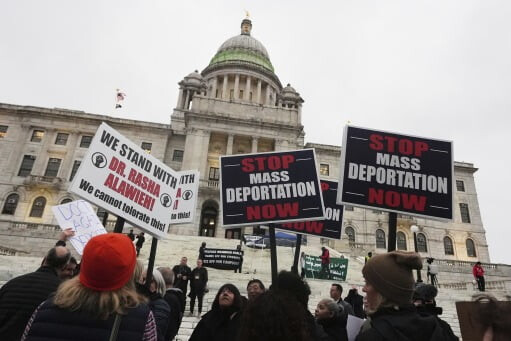
Controversy is mounting as cases of visa revocation and deportation targeting international students and visiting researchers enrolled in US universities are rapidly increasing. It is reported that over 300 student visas were revoked by the end of March. Initially, participants in pro-Palestine protests were the primary targets, but recently, crackdowns are occurring even for social media posts and past minor offenses.
On the 10th (local time), the US Immigration and Citizenship Services (USCIS) announced that for student visa or green card applicants, "applications may be denied if 'anti-Semitic activity' is found on social media." This policy took immediate effect, but it has caused confusion as no clear criteria have been provided regarding what specific social media posts will be considered anti-Semitic activity.
Under Secretary for Border Security and Immigration Trisha McLaughlin stated in a press release, "There is no space in the United States for those who sympathize with terrorists, and we have absolutely no obligation to keep them here." She further warned, "If you think you can hide behind the First Amendment to commit anti-Semitic violence and terrorism, think again."
However, there is growing criticism that this "cold wave" targeting foreign students and researchers is excessive. According to a CNN report, Senator Marco Rubio stated that at least 300 student visas were revoked by the end of March, and the number reaches 340 when including visiting professors and researchers.
The reasons for the crackdown are also gradually expanding. In addition to simple social media posts, past minor offenses and even cases of visa revocation without clear reasons are occurring. Xiaotian Liu, a computer science graduate student at Dartmouth College who has been studying in the US since 2016, faced deportation threats from Immigration and Customs Enforcement (ICE) despite stating that he "had not committed any crimes and had no connection to traffic violations, participation in protests, or acts of violence." Dogukan Gungunaydin, a graduate student at the University of Minnesota, also had his visa revoked and was detained by ICE due to a past DUI record. Several universities, including the University of Texas at Austin, Stanford University, and UCLA, have stated that they have not received notifications from the government regarding the visa cancellations of their students, adding to the confusion.
Furthermore, it has been revealed that the Department of Homeland Security (DHS) is strongly urging foreign students whose visas have been revoked and who face deportation to "voluntarily depart" instead of contesting or being detained. Secretary of Homeland Security Kristie Noem stated in a press release that the DHS's "CBP One" app "offers foreign nationals the option to depart now and voluntarily remove themselves, so they can legally return to the United States in the future and pursue their American Dream." She sternly warned, "Otherwise, we will find you and deport you, and you will not be allowed to return." The DHS also stated that "a penalty of $998 per day may be imposed for remaining in the United States after a final order of removal," increasing the pressure.
This stringent US policy is drawing criticism for infringing on freedom of expression and imposing excessive punishment, raising concerns in the international community. In particular, using social media posts as grounds for visa revocation without clear criteria leaves room for arbitrary interpretation, amplifying the anxiety of international students. Moreover, the decision to deport individuals based on past minor offenses is also being criticized for tarnishing the US's image as the "land of opportunity."
This move by the US government can be interpreted as an attempt to strengthen surveillance and control over foreigners under the guise of enhancing domestic security. However, regarding a wide range of international students and researchers as potential threats without concrete evidence and implementing coercive deportation policies could hinder academic exchange and international cooperation, potentially weakening US competitiveness in the long run. The international community is urging the US government to establish more cautious and transparent standards to protect the rights of international students and researchers and to foster an international education environment based on mutual respect and understanding.
[Copyright (c) Global Economic Times. All Rights Reserved.]






























